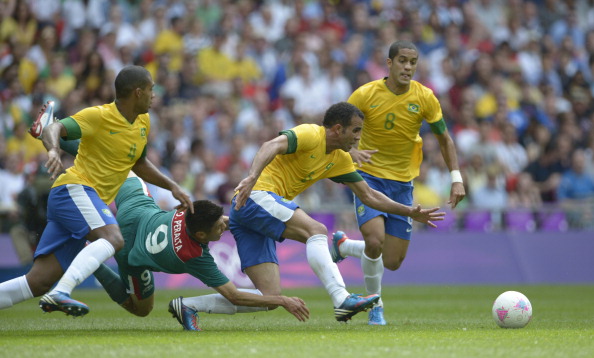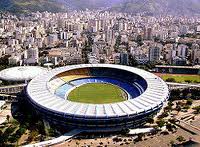By David Gold
September 1 – FIFA and Brazil 2014 have denied reports that Rio de Janeiro’s Maracanã could stage a quarterfinal of the World Cup.
Various Brazilian media outlets were reporting that FIFA wanted to change the schedule to enable the famous stadium (pictured above), which will stage the final of the tournament, to also hold a quarterfinal if Brazil were playing.
When FIFA revealed the tournament schedule last October, there was concern that the Brazilian public would only see the national team playing at the iconic Maracanã if they reached the final.
“FIFA and the Local Organising Committee [LOC] would like to clarify that reports in the Brazilian media claiming a change in the match schedule for the 2014 FIFA World Cup in order to stage a quarter-final with potential Brazilian participation in Rio are incorrect,” FIFA said in a statement.
“The match schedule for the 2014 FIFA World Cup has not been modified since it was approved by the FIFA Executive Committee in October 2011.”
FIFA did confirm that the Mayor of Rio, Eduardo Paes, had expressed a preference that the city stage a Brazil game during the tournament.

However, it is far from certain that Brazil (pictured above in yellow and blue strip) will reach the final, particularly given their insipid performance in the final at London 2012 Olympic Games tournament against Mexico.
Mano Menezes’ Brazil team featured a number of players expected to form the nucleus of the 2014 team, and the coach’s position is now in doubt.
The decision that Brazil would only play in Rio if they reach the final is said to be a direct consequence of the country’s political football culture.
At the time of the unveiling World Cup schedule, the President of the Brazilian Football Confederation (CBF) and head of Brazil 2014 was Ricardo Teixeira – the controversial ex son-in-law of former FIFA President João Havelange.
He has since left both posts, but it is claimed that the schedule was designed to please as many different states as possible by ensuring they would get to host a Brazil game during the tournament, because it is those states who vote for the CBF President.

It was for that reason that Teixeira passed on the decision to name the host cities of the World Cup to FIFA to avoid upsetting those left out.
The fact that there is no “clustering”, with some teams set to travel across the country during the group phase, has also attracted heavy criticism.
The alternative to clustering would have been to give some teams the advantage of playing in the cooler temperatures of the south – as the World Cup takes place during the Brazilian winter.
Another cause for consternation for some also comes from the schedule, which cites nearby São Paulo (stadium pictured above) as hosting Brazil’s opening match, as well as the opener to the entire tournament.
Rio and São Paulo, Brazil’s two biggest cities, share a fierce rivalry.
The Maracanã is being renovated at a cost of almost R$1 billion (£309 million/$493 million/€391 million) for the World Cup and the Olympics and Paralympics which Rio is hosting in 2016.
The venue will host the Opening and Closing Ceremonies of those Games.
Contact the writer of this story at zib.l1745328106labto1745328106ofdlr1745328106owedi1745328106sni@d1745328106log.d1745328106ivad1745328106

